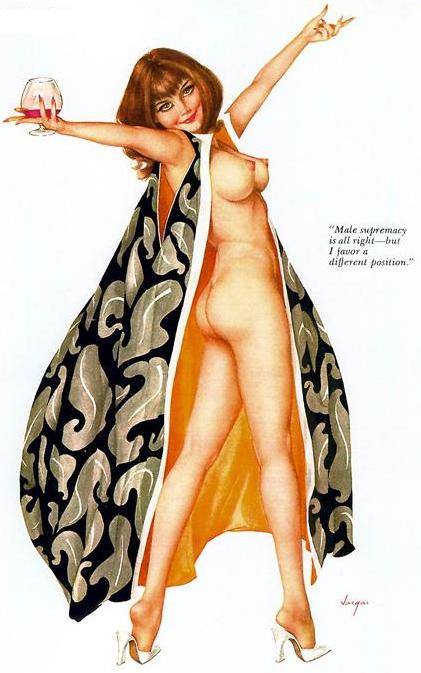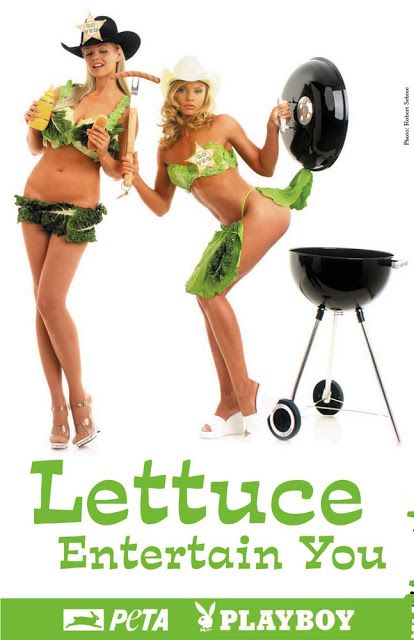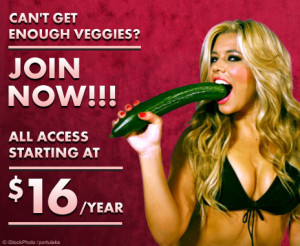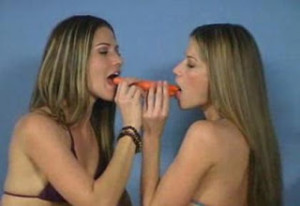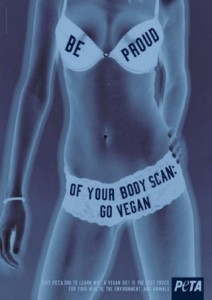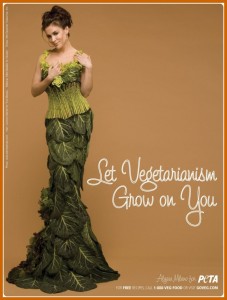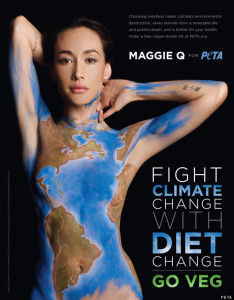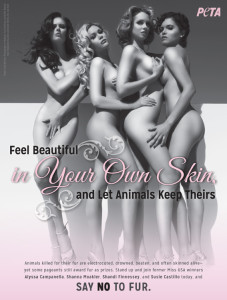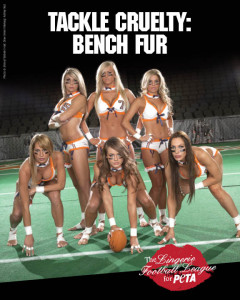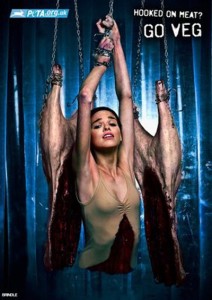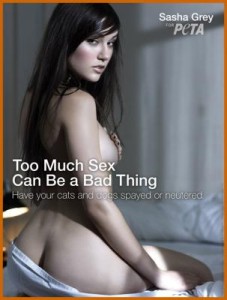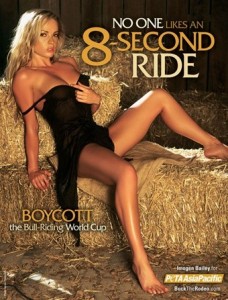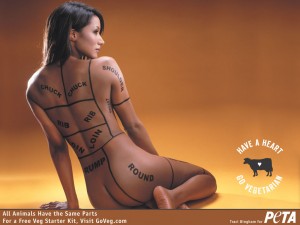Trigger Warning: Discusses prostitution and pornography.
Not Safe for Work: Contains nude images.
 Nude protest has a long history in social activism, but it is certainly gaining a lot of momentum in today’s hyper-sexualized world where pornography is mainstream and third-wave feminism prioritizes sexualization as empowerment. Media attention is a social movement’s best asset. It gets the organization more recognition, attracts more volunteers, and more importantly, it brings in more donations. These days, to get media attention in a digitized, high-speed media landscape that is bombarded with trillions of competing images, some social movement organizations attempt to stand out with free soft-core porn. Free sampling is a technique heavily utilized by pornographers in a highly competitive online pornography space. They give the consumer a little taste of the product with the expectation that the consumer will become excited and will want to purchase more.
Nude protest has a long history in social activism, but it is certainly gaining a lot of momentum in today’s hyper-sexualized world where pornography is mainstream and third-wave feminism prioritizes sexualization as empowerment. Media attention is a social movement’s best asset. It gets the organization more recognition, attracts more volunteers, and more importantly, it brings in more donations. These days, to get media attention in a digitized, high-speed media landscape that is bombarded with trillions of competing images, some social movement organizations attempt to stand out with free soft-core porn. Free sampling is a technique heavily utilized by pornographers in a highly competitive online pornography space. They give the consumer a little taste of the product with the expectation that the consumer will become excited and will want to purchase more.
When I set out to write this essay, I had hoped to explore social movements as a whole, but sadly, once again, the Nonhuman Animal rights movement steals the show in its problematic treatment of women. The only other large social movement (that isn’t the nudity movement itself, where people advocate for the freedom to be naked without penalization) is the peace and anti-war movement. Breasts Not Bombs, for instance, has female volunteers march in public spaces holding political signs.
Then there’s Femen, a male-led feminist group of mostly white, thin young women who claim to speak on behalf of all women (and sometimes brown women in particular) by going topless in public spaces.
Aside from these exceptions, getting naked for a cause is the Nonhuman Animal rights movement’s modus operandi. And, though many supporters of Nonhuman Animal rights organizations that utilize sexualization as a tactic may claim that men’s naked bodies are used, too, the overwhelming majority of sexualized bodies presented to the public are that of young, thin, white women. With 80% of the movement identifying as female, the movement’s largest volunteer pool offers to organizations a wealth of physical assets. Body parts are politicized to the exclusion of women’s intelligence, skills, creativity, dedication, or leadership ability.
Organizations like PETA take female volunteers, put them on street corners, posters, and film, and, for all intents and purposes, prostitute these unpaid women to extract funding, media attention, or other resources (incidentally PETA may be the most infamous, but it is certainly not the only organization engaging this tactic). This systemic social movement prostitution is defended in ways similar to that of typical street prostitution: women choose to do it, or she’s getting something out of it. But free choice is often an illusion. Women do not have the same choices available to them that men do. Women in Nonhuman Animal rights are being funneled into the “choice” of stripping down for the male gaze in public spaces. Do women get something out of it? Some do, particularly middle-class white women. Is nudity a bad thing? No, of course not. But we need to be cognizant of patterns and power. There is a pattern of women’s bodies being used in a world where men have the power.
Female activists are “selling” their bodies for resources, but none of the profit goes to these sex workers. Instead, the money raised goes to the organizations that they represent. If a John buys a prostituted woman for sex acts, he pays her, and more often than not, the money goes to her pimp. If a John buys a PETA membership because of his interest in PETA’s women (see PETA’s “Veggie Love” campaign for example), the money goes to her organization.
Incidentally, there is a vegan strip club in Portland, Oregon where women are also being prostituted for “the cause.” The male club owner insists that “throwing boobs out there” is the only way to get people to visit his restaurant and try his vegan menu. He claims he wants to “end the suffering of all creatures,” but it seems that he and the movement ignore the fact that women are “creatures,” too. We can be certain that “throwing penises out there” would draw some attention as well, but, patriarchy ensures that it is female nudity that will expected.
Stripping, like prostitution, is sex work that often preys on vulnerable populations of women (many feminists and survivors regard “sex work” to be a euphemism; for women who are trafficked, we must recognize it as sex slavery). It is “work” with extremely high rates of sexual assault, rape, and other forms of violence. It is “work” that is extremely difficult for most women to make a living with and it is “work” with little job security. Strip clubs have a strict set of rules that ensure most money stays in the hands of the male owners, not in the hands of the hard-working women. Like prostitution, stripping is glamorized or romanticized in the liberal imagination as something freely chosen by independent women who have full control over their work and lives. Some women enjoy that kind of agency, but most women do not.
Social activism today has been swept into the Non-Profit Industrial Complex, where organizations must compete for vital fundraising in order to survive. This extreme dependence on funding means that tactics are compromised, and advocacy becomes a means of making money to sustain the organization, not changing the world. In other words, even if viewers were to begin supporting Nonhuman Animal rights organizations as a result of being exposed to these sexualized tactics (and there is no evidence to support such a notion), most of the money raised will not be used in support of anti-speciesism. Instead, most of it will be put toward keeping the lights on, paying staff members, and funding more ways to raise money.
I argue that the Nonhuman Animal rights movement squanders an important resource by degrading women’s participation to stripping and legal forms of prostitution. So much more could be accomplished by nurturing women’s brains instead of objectifying their bodies. Beyond the negative impact that these tactics are having on so many of the girls and women groomed by the movement, we also need to take into account the impact that this type of activism has on women as a demographic. The socially-accepted degradation of women and their sexual objectification is directly linked with discrimination and violence against women. This is a consequence that social justice movements should take very seriously.
 Dr. Wrenn is Lecturer of Sociology. She received her Ph.D. in Sociology with Colorado State University in 2016. She received her M.S. in Sociology in 2008 and her B.A. in Political Science in 2005, both from Virginia Tech. She was awarded Exemplary Diversity Scholar, 2016 by the University of Michigan’s National Center for Institutional Diversity. She served as council member with the American Sociological Association’s Animals & Society section (2013-2016) and was elected Chair in 2018. She serves as Book Review Editor to Society & Animals and has contributed to the Human-Animal Studies Images and Cinema blogs for the Animals and Society Institute. She has been published in several peer-reviewed academic journals including the Journal of Gender Studies, Feminist Media Studies, Disability & Society, Food, Culture & Society, and Society & Animals. In July 2013, she founded the Vegan Feminist Network, an academic-activist project engaging intersectional social justice praxis. She is the author of A Rational Approach to Animal Rights: Extensions in Abolitionist Theory (Palgrave MacMillan 2016).
Dr. Wrenn is Lecturer of Sociology. She received her Ph.D. in Sociology with Colorado State University in 2016. She received her M.S. in Sociology in 2008 and her B.A. in Political Science in 2005, both from Virginia Tech. She was awarded Exemplary Diversity Scholar, 2016 by the University of Michigan’s National Center for Institutional Diversity. She served as council member with the American Sociological Association’s Animals & Society section (2013-2016) and was elected Chair in 2018. She serves as Book Review Editor to Society & Animals and has contributed to the Human-Animal Studies Images and Cinema blogs for the Animals and Society Institute. She has been published in several peer-reviewed academic journals including the Journal of Gender Studies, Feminist Media Studies, Disability & Society, Food, Culture & Society, and Society & Animals. In July 2013, she founded the Vegan Feminist Network, an academic-activist project engaging intersectional social justice praxis. She is the author of A Rational Approach to Animal Rights: Extensions in Abolitionist Theory (Palgrave MacMillan 2016).
Receive research updates straight to your inbox by subscribing to my newsletter.



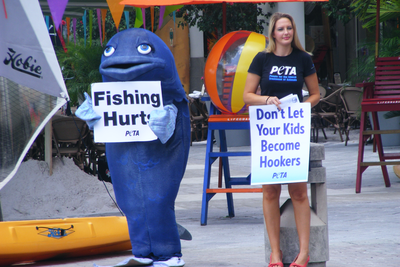
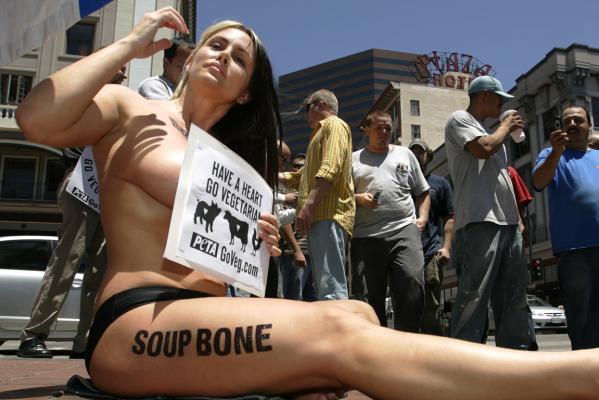

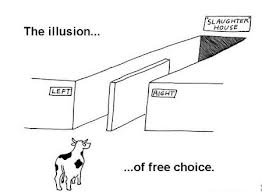
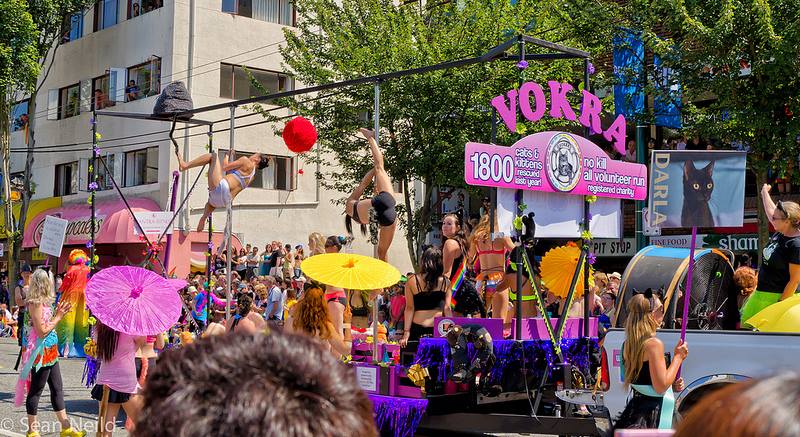 Relatedly, the sexual objectification of women and the consumption of pornography is linked to increased violence and rape against women. Take a guess which women experience the highest rates of violence and rape? The privileged able-bodied white cis women who dominate naked protest? Nope, guess again. It is actually women of color, poor women, lesbian women, trans women, disabled women, and other vulnerable women pay the price of white women’s “empowerment.” Privileged young white women can enter public spaces, flaunt their sexuality, and find it “liberating,” but it’s the masses of poor and disadvantaged women who are not allowed to participate who also bear the brunt of that “liberation” through rape, sexual harassment, and beatings.
Relatedly, the sexual objectification of women and the consumption of pornography is linked to increased violence and rape against women. Take a guess which women experience the highest rates of violence and rape? The privileged able-bodied white cis women who dominate naked protest? Nope, guess again. It is actually women of color, poor women, lesbian women, trans women, disabled women, and other vulnerable women pay the price of white women’s “empowerment.” Privileged young white women can enter public spaces, flaunt their sexuality, and find it “liberating,” but it’s the masses of poor and disadvantaged women who are not allowed to participate who also bear the brunt of that “liberation” through rape, sexual harassment, and beatings.